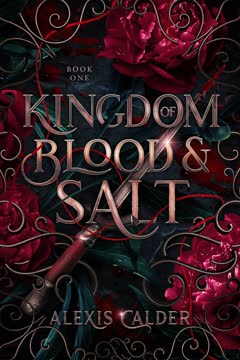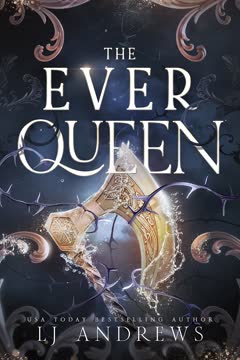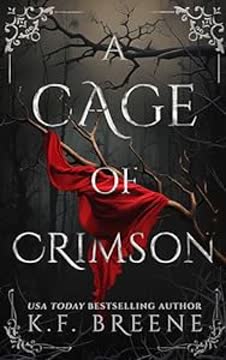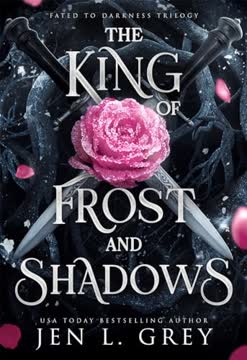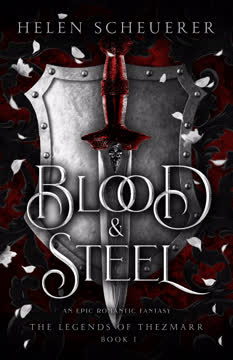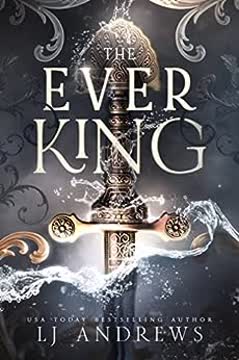Plot Summary
War's End, Hope's Ashes
Serenity Freeman, a young woman forged by loss and violence, lives in the ruins of a world devastated by a decades-long war between the Western United Nations (WUN) and the Eastern Empire, ruled by the enigmatic and ruthless King Montes Lazuli. The war has stripped away not only the comforts of civilization but also hope itself, leaving Serenity and her people clinging to survival in underground bunkers. Her memories are haunted by the death of her mother, the destruction of her home, and the relentless hunger and fear that have become daily companions. Yet, even as hope flickers, Serenity's spirit remains unbroken, setting the stage for a story where survival, sacrifice, and the possibility of redemption are all that remain.
The Emissary's Daughter Chosen
As the WUN faces inevitable defeat, Serenity is summoned by her father, the last emissary, and the remaining leaders. She is to accompany him to Geneva for peace talks with King Lazuli—a mission that is, in truth, a death sentence. The leaders hope Serenity's youth and beauty will sway the king, using her as a symbol to inspire hope or, at worst, as a sacrificial lamb. Serenity's relationship with Will, the general's son and her closest friend, is tinged with unspoken love and the knowledge that their world has no place for such things. As she prepares to leave, Serenity is forced to confront the reality that her life, and the fate of her people, now hinge on her ability to navigate the treacherous waters of diplomacy and seduction.
Dancing with the Devil
Serenity and her father arrive in Geneva, greeted by opulence and the king's intimidating presence. The city, scarred by war yet striving to rebuild, stands in stark contrast to the king's lavish estate. At a grand ball, Serenity meets King Montes Lazuli—a man whose charm is as lethal as his reputation. Their first dance is a battle of wills, each probing the other's weaknesses. Serenity's hatred for the king, who she blames for her mother's death and her nation's ruin, is palpable. Yet, beneath the surface, a dangerous attraction simmers. The king is captivated by Serenity's defiance, seeing in her a kindred spirit shaped by violence and loss. The stage is set for a relationship defined by power, pain, and the possibility of something more.
Scars and Seduction
The peace talks begin, but it's clear the king holds all the cards. Serenity, forced into the role of seductress, must use her body and wits to secure medical relief for her dying people. The king, both predator and protector, tests her resolve, pushing her to the edge of her endurance. Their interactions are a dance of seduction and threat, each trying to gain the upper hand. Serenity's memories of violence—her first kill, her training as a soldier—haunt her, fueling both her hatred and her strength. The king's fascination with her deepens, and Serenity realizes that her greatest weapon may be her refusal to break, even as she is forced to compromise her own boundaries for the sake of her nation.
Negotiations and Ultimatums
The king's terms are brutal: he will grant the WUN medical relief and economic aid only if Serenity stays with him. Her father refuses to sign away her life, leading to a violent confrontation. In a bloody escape, Serenity's father is killed before her eyes, and she is forced to fight her way out, her hands stained with the blood of enemies and allies alike. The trauma of her father's death and the betrayal by those she once trusted harden Serenity further. She returns to her homeland, now a symbol of both hope and horror, her body and soul marked by the cost of survival. The peace she fought for comes at the price of her own freedom.
The King's Game
The WUN, desperate to save millions, agrees to the king's demand: Serenity will be delivered to him as the price of peace. Serenity, shattered by grief and betrayal, submits to her fate. She is taken to the king's Mediterranean palace, where preparations for their marriage begin. The World watches as the union of king and queen is framed as a symbol of reconciliation, but for Serenity, it is a gilded cage. The king, for all his power, reveals glimpses of vulnerability and genuine affection, complicating Serenity's hatred. As she is drawn deeper into his world, Serenity must decide whether to cling to her anger or find a way to survive—and perhaps even thrive—within the monster's embrace.
Bargains of Flesh and Power
Serenity and Montes are wed in a spectacle broadcast to the world, their union both a political maneuver and a personal crucible. The king's desire for Serenity is matched only by his need for control, and their wedding night is a collision of pain, pleasure, and unresolved trauma. Serenity, still mourning her father and her lost freedom, finds herself both repulsed by and drawn to the king. Their relationship becomes a battleground, each testing the other's limits, each discovering unexpected depths of vulnerability and desire. As queen, Serenity is given access to the king's secrets and the machinery of power, but she remains determined to use her position to help her people—and, if possible, to destroy the king from within.
The Price of Peace
As Serenity settles into her role as queen, the world outside the palace erupts in rebellion. The Resistance, once her allies, now see her as a traitor, and the king's enemies multiply. Serenity is caught between two worlds, her loyalties tested as she is forced to betray former friends to protect her new position—and her own life. The king's humanity begins to show through cracks in his armor, and Serenity is forced to confront the possibility that he is not the monster she believed. Yet, the cost of peace is high: betrayal, violence, and the constant threat of death. Serenity's health begins to fail, a legacy of the war's radiation, and she must rely on the king's advanced medical technology to survive.
Betrayal in Blood
Serenity is kidnapped by The Resistance, led by Will, who now sees her as both a tool and a threat. Tortured and blackmailed, Serenity refuses to betray the king, even as Will threatens her life. The lines between friend and enemy blur, and Serenity is forced to confront the reality that both sides are willing to use her for their own ends. The king's forces rescue her in a bloody assault, and Will is captured and executed. The experience leaves Serenity more isolated than ever, her trust shattered, her sense of self eroded by the violence and manipulation of those around her. Yet, in her darkest moments, she finds unexpected strength—and a growing, complicated love for the king.
Escape and Ruin
The Resistance launches a full-scale assault on the king's palace, using stolen weapons and insider knowledge. Serenity, caught in the crossfire, fights desperately to survive, her body battered and her mind fraying. In a final act of desperation, Marco—her father's killer and the king's right hand—injects her with a serum that erases her memories, hoping to protect the king's secrets from torture. As Serenity is captured by The Resistance, her identity slips away, leaving her a blank slate in the hands of her enemies. The king, devastated by her loss, is left to pick up the pieces of a world once again on the brink of chaos.
The Queen Returns
Serenity awakens in a hospital, her memories fragmented, her body healed by the king's technology. As she struggles to reclaim her identity, she is thrust back into the center of political intrigue and rebellion. The Resistance's smear campaign against her intensifies, and the world questions her loyalty. The king, torn between love and ruthlessness, must decide whether to trust Serenity or use her as a pawn in his own game. Together, they face the challenge of rebuilding not only their relationship but also a world scarred by war, betrayal, and the high cost of peace.
The King's Demand
In the aftermath of violence and loss, Serenity and Montes confront the truth of their pasts and the possibility of a future together. Serenity scatters her father's ashes, seeking closure and the strength to forgive—not for the king's sake, but for her own. The king, haunted by his own sins, reveals the origins of his power and the choices that made him a monster. Their relationship, forged in hatred and necessity, becomes something more: a partnership built on mutual understanding, shared pain, and the hope of redemption. As they turn their attention to healing the world, Serenity and Montes discover that love, like war, demands sacrifice—but it also offers the chance for peace.
Marriage of Enemies
Serenity and Montes's marriage is a spectacle, a political tool, and a personal crucible. The world watches as the emissary's daughter and the undying king are bound together, their union a symbol of both hope and oppression. Serenity, forced to play the role of queen, navigates the treacherous waters of court politics, public scrutiny, and private pain. The king, for all his power, is revealed to be as vulnerable as the woman he has claimed. Their relationship, fraught with tension and desire, becomes a microcosm of the world they seek to rebuild—a world where love and hate, power and vulnerability, are inextricably linked.
The Queen's Awakening
As Serenity recovers from her wounds and the trauma of memory loss, she begins to assert her own will within the king's court. Refusing to be a pawn, she demands a role in shaping the future, using her position to advocate for the suffering and marginalized. The king, both threatened and intrigued by her defiance, grants her access to the machinery of power. Together, they begin the slow, painful work of healing a world broken by war. Serenity's journey from victim to queen is marked by moments of doubt, anger, and hope, as she learns that true power lies not in domination, but in the ability to forgive, to love, and to change.
Resistance and Rebellion
The Resistance's campaign against Serenity and the king reaches a fever pitch, with uprisings, assassinations, and the spread of damning evidence. Serenity, once a symbol of hope, is now seen as a traitor by many. The king's grip on power is threatened, and both must navigate a world where trust is scarce and enemies are everywhere. As violence escalates, Serenity and Montes are forced to confront the limits of their own power—and the possibility that peace may be as elusive as ever. In the crucible of rebellion, their relationship is tested, and the choices they make will determine not only their own fates, but the fate of the world.
The Monster's Humanity
In the midst of chaos, Serenity and Montes reveal their deepest fears and regrets. The king confesses the origins of his immortality and the choices that led to the world's devastation. Serenity, grappling with her own mortality and the legacy of violence, finds the strength to forgive—not for the king's sake, but for her own. Their relationship, once defined by hatred and necessity, becomes a source of healing and hope. Together, they confront the reality that true power lies not in domination, but in the ability to change, to love, and to build something new from the ashes of the old world.
The Cost of Survival
As the world teeters on the brink of another war, Serenity and Montes work to heal the wounds of the past. Serenity, now fully embracing her role as queen, leads efforts to bring relief to the suffering and to rebuild shattered communities. The king, once a symbol of death and destruction, becomes a partner in the work of restoration. Their love, hard-won and imperfect, becomes a beacon of hope in a world still haunted by violence. Yet, the cost of survival is high: memories lost, friends betrayed, and the constant threat of death. In the end, it is their willingness to sacrifice for each other—and for the world—that offers the possibility of redemption.
Memory's Edge, Love's End
In the aftermath of rebellion and loss, Serenity and Montes stand on the edge of a new world. Serenity's memories, once erased, begin to return, and with them, the pain and hope of all she has endured. The king, no longer undying, faces the reality of his own mortality and the consequences of his choices. Together, they must decide whether to cling to the past or embrace the possibility of a future built on forgiveness, love, and the hard work of healing. Their story, born in war and forged in pain, becomes a testament to the resilience of the human spirit—and the enduring power of hope.
Characters
Serenity Freeman
Serenity is the daughter of the WUN's last emissary, shaped by loss, violence, and the relentless demands of survival. Her childhood was marked by the death of her mother and the destruction of her home, forging her into a soldier and a leader. Serenity's psychological landscape is defined by trauma, resilience, and a fierce sense of duty. She is both a victim and an agent, forced to use her body and mind as weapons in a world that values neither. Her relationship with King Montes Lazuli is fraught with hatred, attraction, and the possibility of redemption. Over the course of the story, Serenity evolves from a pawn in others' games to a queen who claims her own agency, learning to forgive, to love, and to lead—even as she grapples with the cost of survival and the fragility of hope.
King Montes Lazuli
Montes is the enigmatic and feared king of the Eastern Empire, a man whose charm masks a history of violence and moral compromise. His immortality, gained through a mysterious drug, has made him both powerful and isolated. Montes is a master of strategy and manipulation, but beneath his armor lies a deep well of loneliness and regret. His fascination with Serenity is both predatory and genuine, as he sees in her a reflection of his own darkness and the possibility of redemption. Over time, Montes reveals vulnerability and a capacity for love, challenging his own identity as a monster. His relationship with Serenity becomes a crucible in which both are transformed, forced to confront the consequences of their choices and the possibility of change.
Will Kline
Will is the son of the WUN's general and Serenity's childhood friend, representing the life and love that might have been. His journey from loyal companion to leader of The Resistance is marked by betrayal, ambition, and the corrosive effects of war. Will's love for Serenity is twisted by jealousy and the demands of survival, leading him to use and ultimately betray her. His actions force Serenity to confront the reality that even those closest to her can become enemies, and that the lines between right and wrong are often blurred by necessity. Will's fate is a tragic reminder of the cost of war and the fragility of trust.
Carl Freeman
Serenity's father is the last emissary of the WUN, a man of principle and quiet strength. His love for Serenity is unwavering, and his willingness to sacrifice himself for her and for their people is both his greatest strength and his undoing. Carl's death is a pivotal moment in Serenity's journey, marking the end of her childhood and the beginning of her transformation into a queen. His legacy lives on in Serenity's determination to survive, to lead, and to find peace in a world that has known only war.
Marco
Marco is the king's trusted advisor and the man responsible for many of the story's darkest turns. His actions—killing Serenity's father, orchestrating betrayals, and ultimately erasing Serenity's memories—make him both a villain and a tragic figure. Marco's loyalty to the king is absolute, but his methods are ruthless. His final act, erasing Serenity's memories to protect the king, is both a betrayal and a twisted form of loyalty, highlighting the moral ambiguity that pervades the story.
The Resistance
The Resistance is a complex and shifting force in the story, representing both the hope of freedom and the dangers of fanaticism. Once allies of Serenity and the WUN, they become her enemies as the lines between right and wrong blur. Their willingness to use violence, manipulation, and betrayal mirrors the tactics of the king, forcing Serenity to confront the reality that all sides are capable of monstrous acts. The Resistance's actions drive much of the story's conflict, culminating in the assault on the king's palace and Serenity's capture.
Nigel Hall
Nigel is the king's head advisor on global health and wellness, representing the inertia and self-interest of the new regime. His resistance to Serenity's reforms highlights the challenges of rebuilding a world broken by war, and his interactions with Serenity underscore the importance of agency, advocacy, and the willingness to challenge authority.
Henry
Henry is the king's lead investigator, responsible for rooting out threats and enforcing the king's will. His presence is a constant reminder of the surveillance, suspicion, and violence that underpin the new order. Henry's actions, particularly in the aftermath of The Resistance's attacks, illustrate the dangers of unchecked power and the thin line between justice and revenge.
The WUN Representatives
The remaining leaders of the WUN are a fractured and desperate group, clinging to power in a world that has moved on. Their willingness to sacrifice Serenity for the sake of peace is both pragmatic and callous, highlighting the moral compromises demanded by survival. Their fate, as subordinates in the king's new order, serves as a cautionary tale about the dangers of clinging to the past.
The World
The world itself is a character in the story, its landscapes marked by war, radiation, and loss. The struggle to rebuild, to heal, and to find hope in the ashes of destruction is the backdrop against which all other dramas unfold. The world's suffering is both a source of despair and a call to action, challenging Serenity, Montes, and all who survive to imagine a future beyond violence.
Plot Devices
Duality of Love and Hate
The central device of the novel is the forced proximity and emotional entanglement of Serenity and Montes, enemies bound by necessity and desire. Their relationship is a microcosm of the world's struggle to move beyond hatred and violence, exploring the thin line between love and hate, power and vulnerability. The tension between their roles as oppressor and victim, king and queen, is mirrored in their personal interactions, creating a dynamic that is both volatile and transformative.
Memory and Identity
The use of memory as both weapon and refuge is a key device, culminating in Serenity's forced amnesia. The loss and recovery of memory serve as metaphors for trauma, survival, and the possibility of reinvention. The manipulation of memory by those in power—whether through technology, propaganda, or violence—raises questions about the nature of identity, agency, and the possibility of healing.
Power, Sacrifice, and Agency
The story is structured around a series of bargains—personal, political, and existential. Serenity is repeatedly forced to sacrifice her body, her freedom, and her trust for the sake of her people. The shifting alliances, betrayals, and power plays that define the narrative highlight the moral ambiguity of survival in a world without easy answers. The use of seduction, blackmail, and violence as tools of negotiation underscores the high cost of peace and the difficulty of claiming agency in a world determined to use and discard the vulnerable.
Foreshadowing and Nonlinear Memory
The narrative is punctuated by flashbacks to Serenity's childhood, her training as a soldier, and the pivotal moments that shaped her identity. These memories foreshadow the choices she will be forced to make, the losses she will endure, and the resilience that will carry her through. The nonlinear structure mirrors the fragmentation of memory and the disorientation of trauma, creating a sense of inevitability and suspense.
Symbolism of Scars and Healing
Scars—both literal and metaphorical—are central to the story's exploration of pain, resilience, and the possibility of healing. Serenity's scarred body is a testament to her survival, her capacity for violence, and her refusal to be broken. The king's immortality, achieved through unnatural means, is contrasted with Serenity's mortality and the fragility of hope. The process of healing—through technology, love, and forgiveness—is depicted as both painful and necessary, a journey that requires the surrender of old wounds and the embrace of new possibilities.
Analysis
The Queen of All That Dies is a brutal, unflinching exploration of what it means to survive in a world defined by violence, betrayal, and loss. Through the lens of Serenity's journey—from soldier to queen, from pawn to agent—the novel interrogates the costs of survival and the moral compromises demanded by power. The relationship between Serenity and Montes, fraught with hatred, desire, and the hope of transformation, serves as both a personal and political allegory for the world's struggle to move beyond war. The story's use of memory, trauma, and the search for identity highlights the enduring scars left by violence, while its focus on agency, forgiveness, and the hard work of healing offers a glimmer of hope. Ultimately, the novel suggests that redemption is possible—not through the erasure of the past, but through the willingness to confront it, to forgive, and to build something new from the ashes. In a world where monsters and heroes are often one and the same, The Queen of All That Dies challenges us to imagine a future where love, however imperfect, is the most radical act of all.
Last updated:
Review Summary
The Queen of All that Dies receives mixed reviews, with many praising its compelling storyline, complex characters, and intense romance. Readers appreciate the dystopian setting and the enemies-to-lovers dynamic between Serenity and King Lazuli. Some critics find fault with the age difference and consent issues, while others enjoy the morally grey characters and political intrigue. The book's fast-paced plot and cliffhanger ending leave many readers eager for the sequel. Overall, it's a polarizing novel that appeals to fans of dystopian romance with dark themes.



